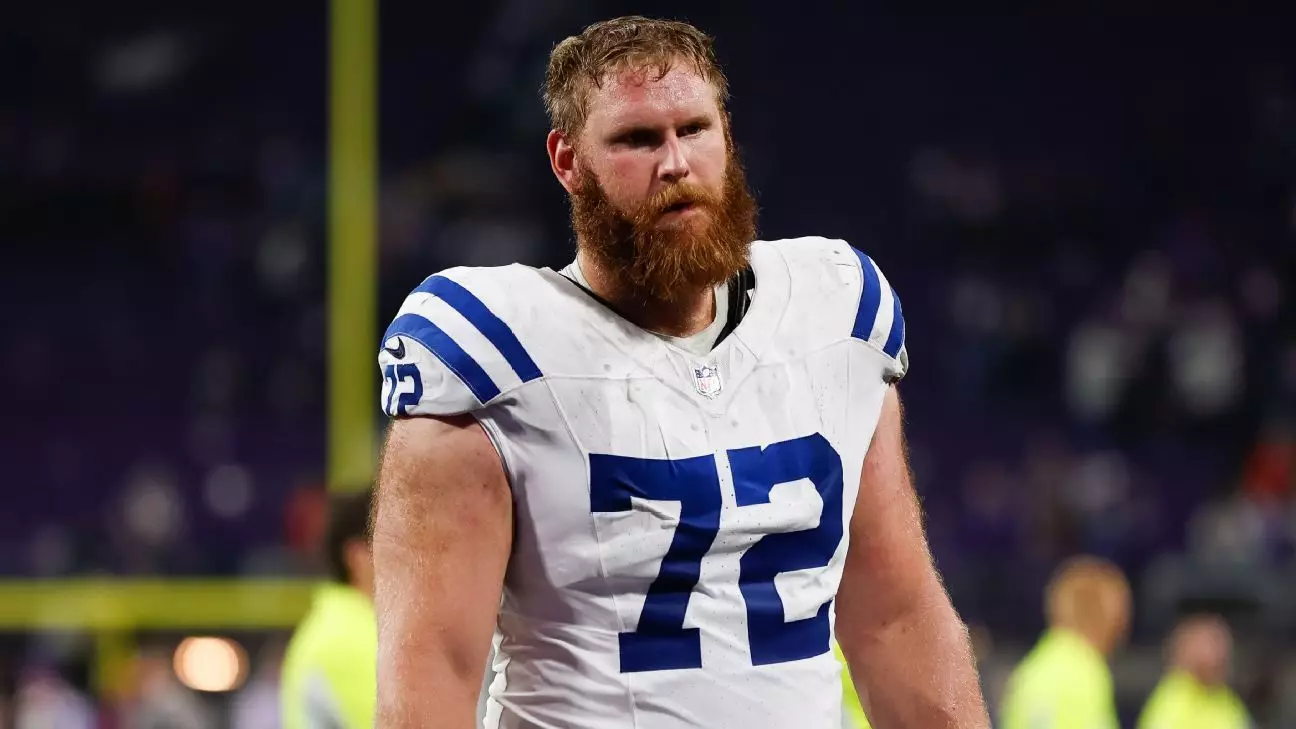In the high-octane world of professional football, players often find themselves celebrated as heroes, both on and off the field. However, what happens when these athletes confront their own demons far removed from the glory of the game? Braden Smith, a veteran offensive tackle for the Indianapolis Colts, recently opened up about a tumultuous battle with mental health that nearly derailed his career. His story is not just one of overcoming personal challenges; it’s a candid reflection on the often-ignored emotional struggles many athletes face in a society that prizes grit over vulnerability.
Facing Demons: The Weight of Obsessive-Compulsive Disorder
During an eye-opening interview, Smith revealed the depth of his struggles with obsessive-compulsive disorder (OCD), specifically, a form known as religious scrupulosity. This condition, marked by a debilitating fear of offending theological or moral standards, can trap individuals in a cycle of compulsive behaviors that overshadow their everyday existence. Smith articulated this torment vividly: he was isolated in his own mind, physically present yet emotionally absent from family, friends, and even his beloved sport. The sheer weight of anticipatory anxiety left him contemplating suicide, revealing how profound mental health struggles can be even within the seemingly invincible world of professional sports.
Smith’s diagnosis is a crucial reminder that mental health issues can pose significant threats to well-being, functioning, and joy—an unsettling insight into a world that often prioritizes physical prowess over emotional fragility. “I did not care about playing football,” he confessed, starkly conveying the debilitating hold OCD had on his psyche. It serves as a heart-wrenching reminder that every athlete’s journey can include uncharted territories where resilience is tested in unimaginable ways.
Seeking Help: The Courage to Choose Healing
Recognizing the gravity of his situation, Smith sought professional help, illustrating an important lesson about the power of openness and vulnerability. In a society where asking for help can be misconstrued as a weakness, Smith’s admission serves to dismantle stigma around mental health challenges. His decision to enter a treatment facility highlights an essential step in the journey toward recovery—a pathway that often requires immense courage.
After weeks in treatment yielded only modest results, Smith turned to a lesser-known alternative: the psychedelic substance ibogaine. Though this therapy is not legally available in the U.S., early research suggests it may hold promise for breaking the cycles of addiction and mental health difficulties. By traveling to Mexico for treatment, Smith demonstrated an uncommon resilience and a willingness to pursue any avenue for recovery, further accentuating the profound need for individualized approaches to mental health treatment.
A New Lease on Life: Reconnecting with What Matters
Emerging from this dark chapter, Smith now finds himself in a much brighter place. His revelations indicate a seismic shift not just in his mental state, but in his overall approach to life and football. “I want to be me again here,” he articulated. This desire signifies more than just a hope; it highlights Smith’s commitment to reclaiming his identity and purpose beyond the scale of a football field.
The Colts’ organization echoed his resilience, with GM Chris Ballard supporting Smith’s character and skill set. Smith’s return on a restructured deal underscores a professional and personal comeback—both poignant and empowering. It reflects a renewed commitment not only to the game but to the well-being he was once close to losing.
A Community of Support: The Power of Connection
Smith’s journey emphasizes the critical importance of support systems in mental health recovery. Whether it’s confiding in a spouse, seeking professional guidance, or sharing experiences publicly, the power of community plays an instrumental role in overcoming adversity. The cultural shift slowly emerging in sports emphasizes the need for athletes to prioritize mental health just as much as physical training. Smith represents a beacon of hope, showing that vulnerability can inform strength, and that the road to recovery is paved not just by individual resolve but also by the love and understanding of those around us.
Amidst the challenge of destigmatizing mental health, Braden Smith stands out as a poignant example of how confronting personal crises can redefine one’s life and career trajectory—a powerful narrative that inspires both athletes and fans alike to prioritize emotional well-being.


Leave a Reply